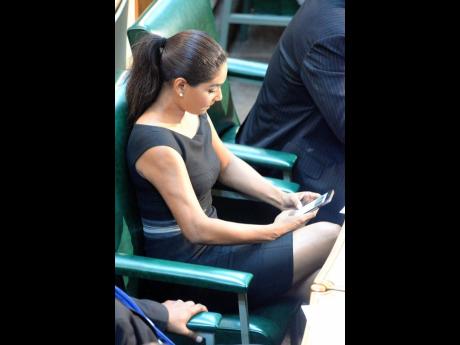CALL TO ARMS
Female parliamentarians, professor back Vaz’s motion to review sleeveless ban
WESTERN BUREAU: A motion by Portland Eastern Member of Parliament (MP) Ann-Marie Vaz for a review and implementation of change in standing orders regarding women’s dress code in Parliament has received overwhelming support from females on both...
WESTERN BUREAU:
A motion by Portland Eastern Member of Parliament (MP) Ann-Marie Vaz for a review and implementation of change in standing orders regarding women’s dress code in Parliament has received overwhelming support from females on both sides of the House.
However, the majority wants the motion expanded beyond Parliament to include state agencies, courts, institutions of learning and hospitals, which prohibit access to citizens who turn up in sleeveless dresses, merinos and certain types of pant suits into these buildings.
Vaz’s motion tabled on Thursday, April 14, noted that sleeveless garments are accepted in corporate chambers and at state gatherings, yet prohibited in the House.
The move comes more than two years after the Minister of Gender Affairs was mandated to formulate, subject to consultation, a government dress code policy that is aligned with modern considerations as well as the climatic realities of Jamaica.
It also comes more than four years after St Ann South Eastern MP Lisa Hanna was reprimanded by former House Speaker Pearnel Charles Sr for wearing what he considered a sleeveless dress to Gordon House.
Hanna, who was wearing a black cap-sleeved dress, was also criticised bitterly by St Andrew West Rural MP Juliet Cuthbert Flynn, who accused her of “attention-seeking”.
Colonial relics
Today, the women in the House, such as Senator Sherene Golding-Campbell, are strident about doing away with what has been tagged as colonial relics.
“Dress code prohibition on the people of Jamaica is not serving the people of Jamaica, so it should go, and we should design for ourselves, the appropriate code. And I don’t want to say just dress code, but what is the appropriate deportment? What is the appropriate conduct when we enter public buildings?” she said.
The attorney-at-law wants Jamaica to get past that era and recognise that what is put in place as structures must serve the people, not hinder them.
For Golding-Campbell, the issue is more than female parliamentarians being allowed to wear comfortable clothing that is climate-friendly. There is a bigger issue of having come out of a colonial history and being subjected to customs of that era.
She charged that Jamaica should examine whether the strictures of this colonial history are appropriate for the country’s independent status, and more so the island’s growth, potentially as a republic.
Her comments were bolstered by gender and development studies university professor, Opal Palmer-Adisa, as well as Senator Janice Allen, both of whom believe that dress code for women is antiquated.
“The fact is our formal and businesswear have been dictated by Eurocentric sensibilities and it is high time we determine for ourselves what is considered applicable, not only because of our climate and comfort, but also based on cultural history,” said Allen.
Taking it a step further, Palmer-Adisa said that it was also absurd for men to be wearing suits and ties in this climate, saying that Jamaicans should define their own aesthetics.
The issue of dress, she adds, is a larger issue that Jamaica needs to look at as it celebrates its 60th year of Independence.
Most of these laws and rules, she contends, were not made with the citizens in mind.
“They were imposed on us and we never had any input. So it should not be delayed any longer,” she told The Gleaner.
Vaz’s colleague parliamentarian, Natalie Campbell-Rodriques, in support of the motion, which she said was long overdue, noted that the arms of the women in Parliament were not symbols of anything bad “and as such should be freely exposed as long as done in a professional-looking manner”.
Earlier this week, journalist Kate Chappell was initially prevented from entering Gordon House as her arms were not covered, although Prime Minister Andrew Holness had, in 2018, instructed the Cabinet secretary to write to ministries, departments and agencies to make them aware that they are were not to deny access or services to persons based on their sleeveless attire, as this was not the policy of the Government.
Turning to court attire, Golding-Campbell, in questioning the logic of wearing a gown and a neck piece that is choking her, also noted that there was no basis for lawyers to be seen as more distinguished than the rest of the society.
“This colonial approach that we have inherited, we haven’t thought about how it defines and influences our psyche. When we strata our society by distinguishing the lawyer from the citizen, what we continue to say is that the people are lesser than the State, which is a message we got out of our years of British rule,” she argued.
Manchester Central MP Rhoda Moy Crawford, in supporting the call, said that comfortable modern wear does not equate to inappropriateness or the absence of modesty.
“There have been days when I would have loved the opportunity to be more comfortably attired, especially since the sittings are usually lengthy,” she admitted.
Senator Dr Saphire Longmore expressed hope that as the nation considers embarking on this new phase of dress mode and code, a certain decorum is maintained.
She, too, has previously felt inclined to wear sleeveless attire to Senate sittings in the past, but was forced to put on a jacket or a shawl.


